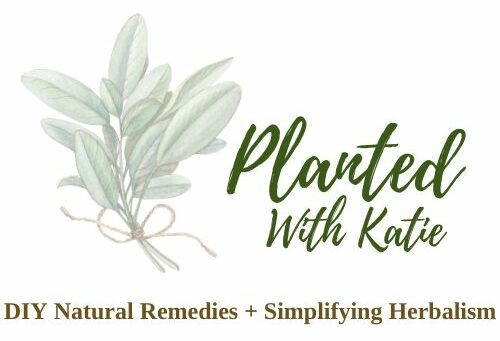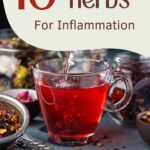Best Herbal Tea for Inflammation (Anti-Inflammatory Tea Blends)
Disclaimer: Information and statements shown here are for educational and informational purposes only and are not to replace the advice of your healthcare professional.
This post may include affiliate links. Please refer to our disclaimer for full disclosure.
In our bustling lives, finding moments of tranquility becomes a precious pursuit. But what if your cup of tea could offer more than just a cozy respite? Herbal Tea For Inflammation can serve you more than just peace and calm, but true health!
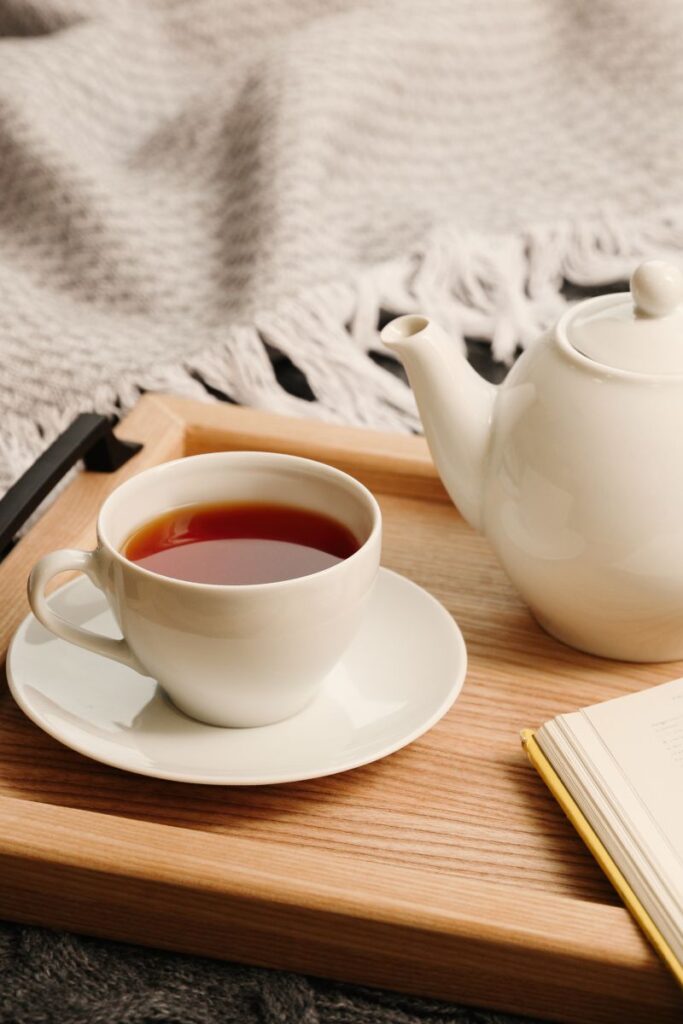
Welcome to the realm of herbal teas, where soothing blends hold the promise of not only relaxation but also a pathway to improved well-being.
Understanding the Power of Herbal Tea for Inflammation
Chronic inflammation, an underlying factor in many health conditions, has garnered increasing attention. Conditions like heart disease, autoimmune disorders, and even certain cancers are believed to be influenced by chronic inflammation.

Our modern lifestyle, often characterized by poor dietary choices, sedentary habits, and high stress levels, can contribute to this inflammatory state. The good news? Scientific research suggests that certain herbal teas could play a role in managing inflammation.
10 Anti-Inflammatory Herbal Teas to Keep You Feeling Great
1. Turmeric Tea
Turmeric, with its vibrant golden hue, is renowned for its remarkable anti-inflammatory properties, primarily attributed to curcumin, its active compound. Curcumin is a potent ally in the battle against inflammation, and its effects have been extensively studied.
Numerous scientific studies have demonstrated curcumin's anti-inflammatory prowess. One notable study published in the journal "Advances in Experimental Medicine and Biology" (2017) [1] highlighted curcumin's ability to inhibit various molecules involved in the inflammatory process, making it an effective agent against inflammation.
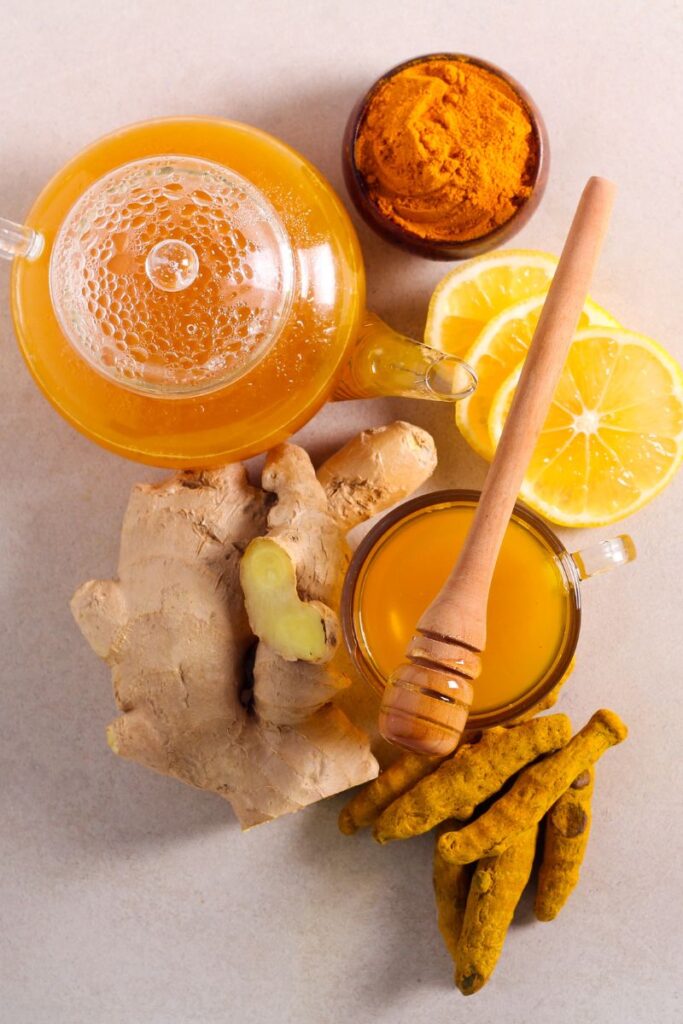
Additionally, research published in "Phytotherapy Research" (2020) [2] delved into the anti-inflammatory effects of curcumin and found that it can help alleviate symptoms in conditions associated with chronic inflammation, such as arthritis and inflammatory bowel disease.
Furthermore, curcumin has shown potential in reducing inflammation in the cardiovascular system. A study published in "Nutrition Journal" (2015) [3] discussed how curcumin supplementation can improve markers of inflammation and reduce the risk of heart disease.
Incorporating turmeric tea into your daily routine can harness the anti-inflammatory benefits of curcumin, providing a natural and soothing way to combat inflammation in your body.
2. Ginger Tea
Ginger root is a trusted remedy for those seeking rapid relief from inflammation, making it a soothing ally for both internal discomfort and digestive issues. Scientific research has provided valuable insights into the anti-inflammatory properties of ginger.
One study, published in "Arthritis & Rheumatology" (2001) [4], examined the effects of ginger extract on patients with osteoarthritis of the knee. The results showed that ginger extract significantly reduced pain and improved joint function, highlighting its potential as a natural anti-inflammatory agent.
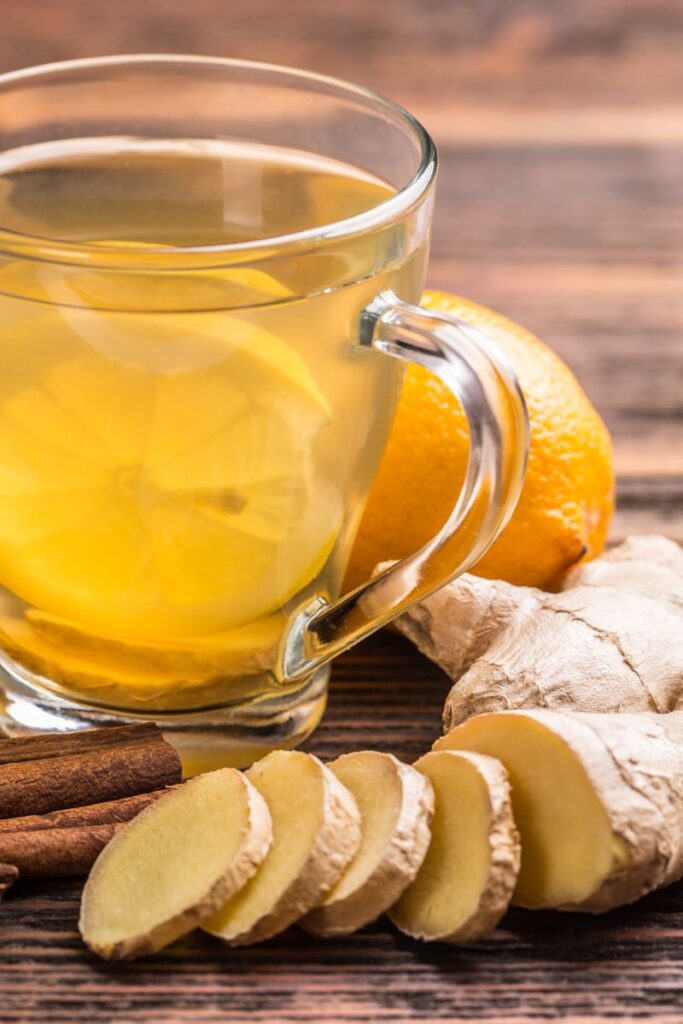
Furthermore, research published in "Journal of Medicinal Food" (2005) [5] explored the anti-inflammatory and analgesic (pain-relieving) properties of ginger. The study found that ginger extract could effectively reduce inflammation and pain in experimental models, supporting its traditional use as a remedy for inflammatory conditions.
Ginger's anti-inflammatory effects extend beyond joint health. A study in "Phytotherapy Research" (2016) [6] examined ginger's impact on inflammatory markers in patients with type 2 diabetes. The findings suggested that ginger supplementation could reduce inflammation and improve metabolic parameters.
With its ability to provide quick relief from inflammation and soothe digestive discomfort, ginger tea stands as a potent natural remedy for those seeking to ease inflammation in a warm and comforting way.
3. Chamomile Tea
Chamomile, often likened to a cozy blanket for your body, possesses anti-inflammatory properties that contribute to its soothing effects. Scientific research supports chamomile's role in reducing inflammation and promoting relaxation.
A study published in the journal "Molecular Medicine Reports" (2010) [7] investigated the anti-inflammatory properties of chamomile. The findings indicated that chamomile extract could inhibit the release of inflammatory mediators, suggesting its potential as a natural anti-inflammatory agent.
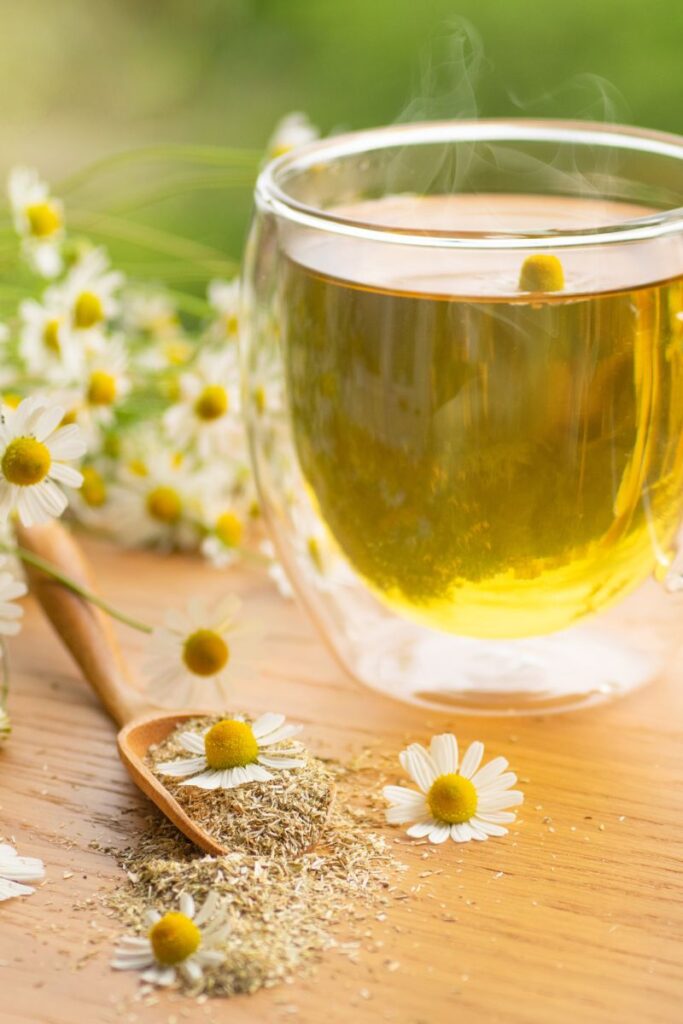
Furthermore, chamomile's calming properties extend to its ability to reduce stress-related inflammation. A study published in "Biological and Pharmaceutical Bulletin" (2007) [8] demonstrated that chamomile extract could alleviate stress-induced inflammation, emphasizing its role as a gentle remedy for calming the body.
Chamomile's anti-inflammatory effects can also benefit skin health. Research in the "Journal of Clinical and Aesthetic Dermatology" (2014) [9] highlighted chamomile's potential in reducing skin inflammation and irritation, making it a valuable ingredient in skincare products.
By incorporating chamomile tea into your routine, you can harness its anti-inflammatory and soothing qualities, providing comfort and relaxation while addressing inflammation in a gentle and natural way.
4. Green Tea
Green tea, celebrated as the ninja of antioxidants, boasts an array of compounds that actively combat inflammation. Various types of green tea, including matcha and sencha, contribute to its anti-inflammatory prowess, supported by scientific research.
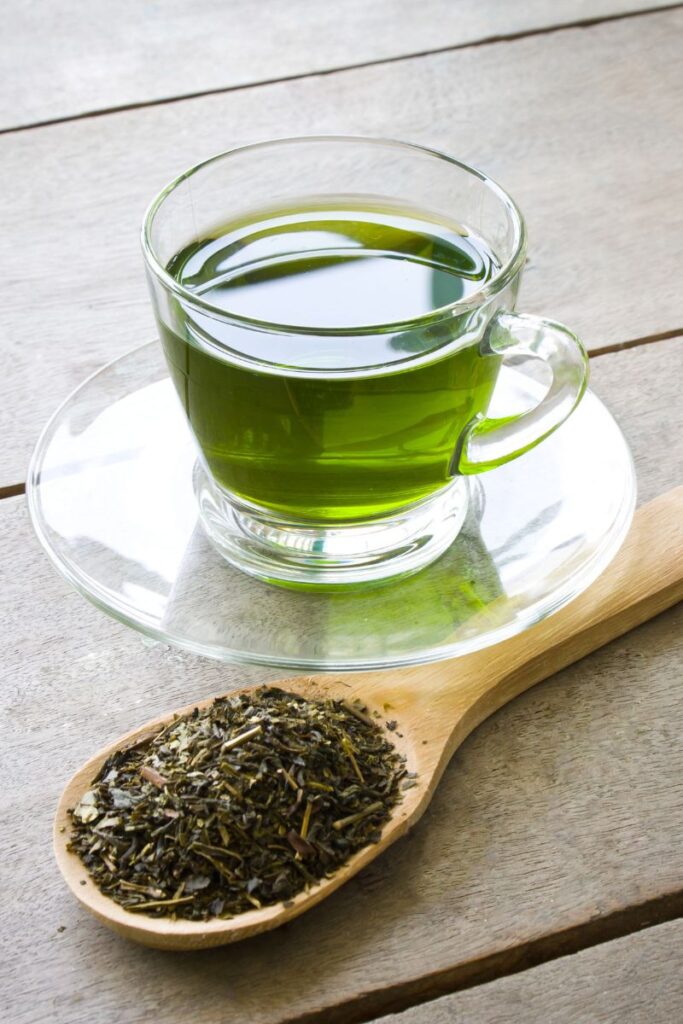
General Green Tea
Green tea, in its more common form, contains a combination of catechins and other polyphenols. A study published in the "European Journal of Nutrition" (2015) [10] investigated the anti-inflammatory effects of green tea polyphenols. The results indicated that regular green tea consumption could reduce markers of inflammation in the body.
Additionally, green tea's anti-inflammatory benefits extend to cardiovascular health. Research in the "American Journal of Clinical Nutrition" (2007) [11] found that green tea consumption was associated with lower levels of inflammatory markers in the bloodstream, potentially reducing the risk of heart disease.
Matcha Green Tea
Matcha, a powdered green tea, is a potent source of catechins, particularly epigallocatechin gallate (EGCG), a potent antioxidant and anti-inflammatory compound. A study published in "Antioxidants" (2020) [12] highlighted EGCG's role in reducing inflammation by inhibiting specific inflammatory pathways.
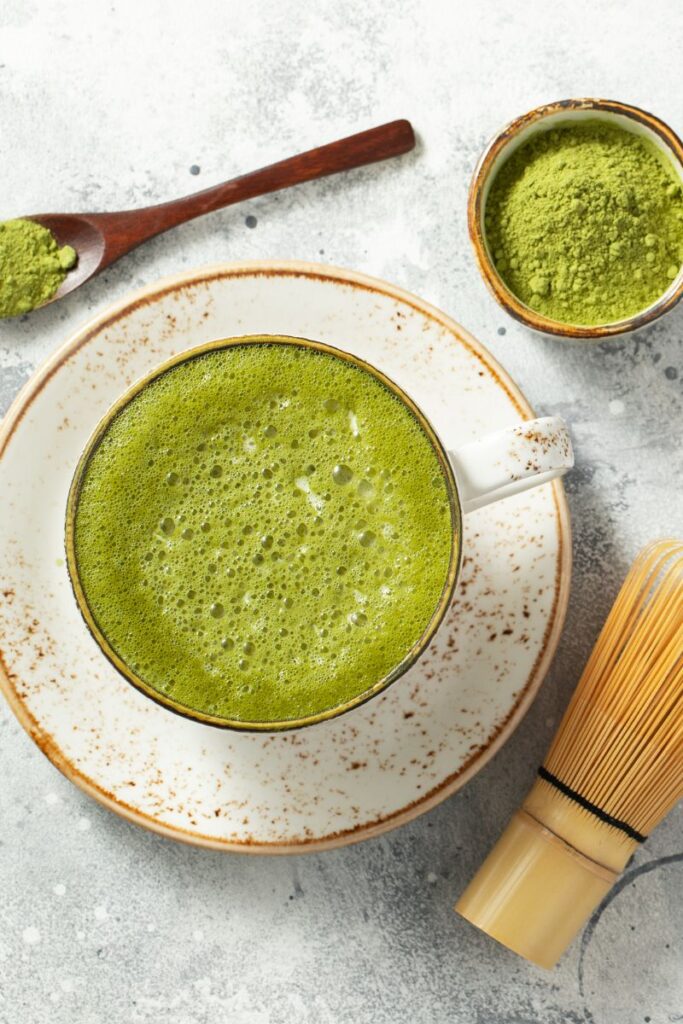
Sencha Green Tea
Sencha, a popular Japanese green tea, is rich in polyphenols, particularly epicatechins. Research in the "Journal of Inflammation" (2005) [13] demonstrated that epicatechins in sencha could effectively suppress inflammation in animal models, emphasizing its anti-inflammatory potential.
By incorporating green tea, especially matcha and sencha, into your daily routine, you can tap into the anti-inflammatory properties of catechins and polyphenols, supporting overall health and well-being.
5. Peppermint Tea
Peppermint tea, like a refreshing breeze for your body, offers relief from inflammation, especially in the digestive system. Its anti-inflammatory properties have been recognized and studied, making it a valuable natural remedy.
Peppermint contains compounds, such as menthol, which contribute to its soothing effects on inflammation. A study published in the "Journal of Gastroenterology" (2010) [14] examined the impact of peppermint oil, a key component of peppermint tea, on irritable bowel syndrome (IBS). The results indicated that peppermint oil could alleviate symptoms related to inflammation in the gastrointestinal tract, providing relief to individuals with IBS.
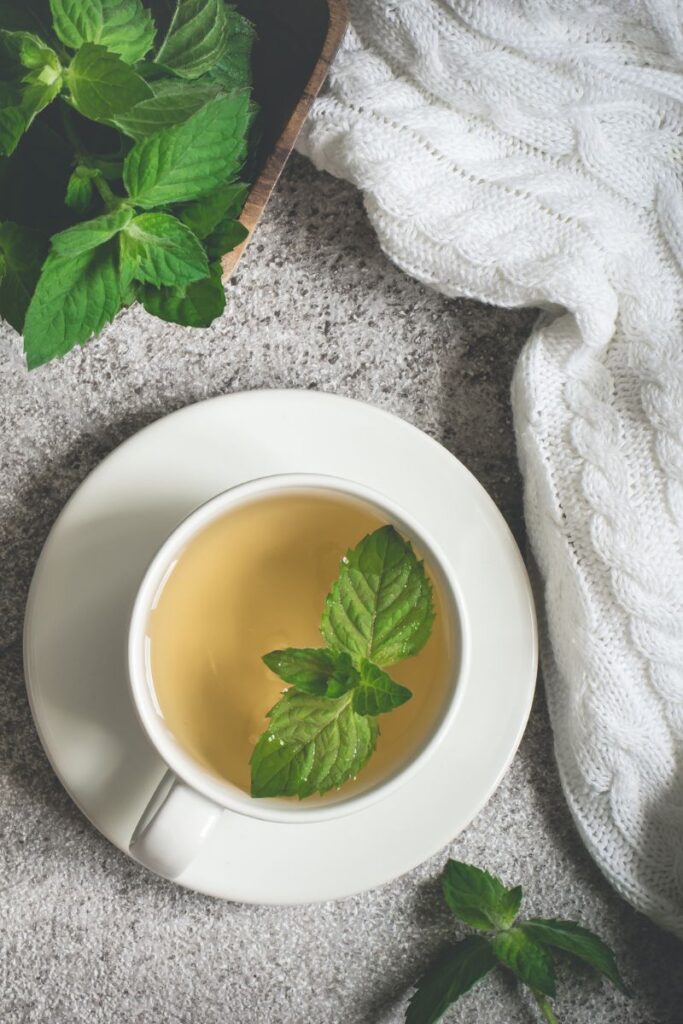
Furthermore, research published in the "International Journal of Food Sciences and Nutrition" (2016) [15] investigated the anti-inflammatory properties of peppermint extract. The study highlighted the potential of peppermint in reducing inflammation and oxidative stress, contributing to its role as a natural anti-inflammatory agent.
Peppermint's cooling and soothing properties make it an excellent choice for addressing inflammation, particularly in the digestive system. By sipping on peppermint tea, you can harness its anti-inflammatory benefits and find comfort in a natural and refreshing way.
6. Echinacea Tea
Echinacea, often hailed as a superhero for the immune system, plays a vital role in addressing inflammation and infections. Its anti-inflammatory properties are backed by scientific research, making it a potent natural remedy.
One study published in "Pharmacological Research" (2007) [16] explored the anti-inflammatory effects of Echinacea extracts. The research revealed that Echinacea could inhibit inflammatory pathways and reduce the production of inflammatory molecules, showcasing its potential as a natural anti-inflammatory agent.
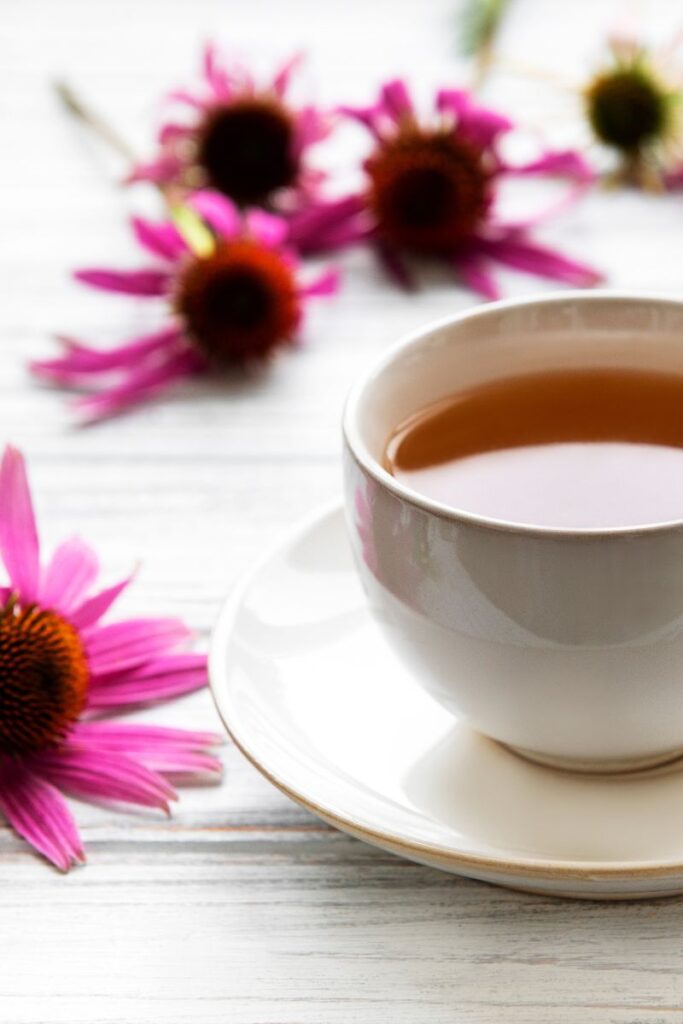
Echinacea's immune-boosting properties further contribute to its anti-inflammatory capabilities. A study published in "Planta Medica" (2010) [17] discussed how Echinacea's immune-enhancing effects could indirectly help the body combat inflammation by bolstering its defenses against infections.
Moreover, Echinacea's role in respiratory health is noteworthy. A study published in "Current Therapeutic Research" (2020) [18] investigated the effects of Echinacea on respiratory symptoms. The findings suggested that Echinacea supplementation could reduce inflammation-related respiratory symptoms, providing relief during cold and flu seasons.
By incorporating Echinacea tea into your routine, you can harness its anti-inflammatory and immune-boosting qualities, providing your body with valuable support in its quest to combat inflammation and infections naturally.
7. Cinnamon Tea
Cinnamon, known for its delightful sweet flavor, serves as a tasty and beneficial addition to your diet when it comes to combating inflammation and maintaining blood sugar levels. Its anti-inflammatory properties are supported by scientific studies.
One key component of cinnamon is cinnamaldehyde, which contributes to its anti-inflammatory effects. A study published in "Pharmacognosy Magazine" (2015) [19] discussed how cinnamaldehyde can inhibit the production of inflammatory molecules and pathways, making it a valuable natural anti-inflammatory agent.
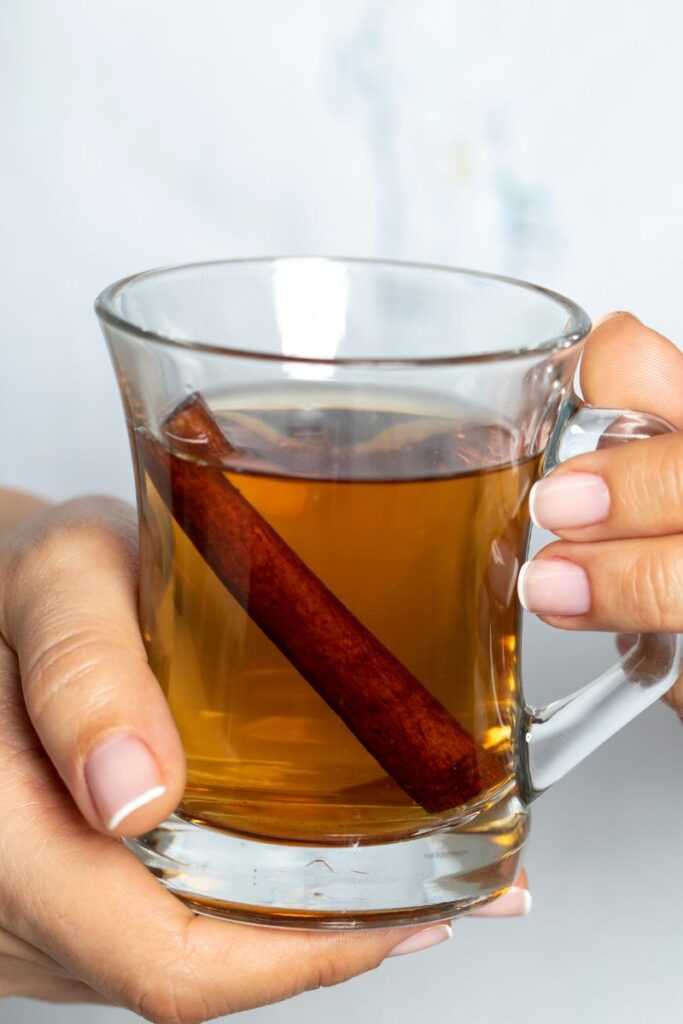
Furthermore, cinnamon's role in regulating blood sugar levels can indirectly influence inflammation. A study published in "Diabetes Care" (2003) [20] examined the effects of cinnamon on glucose control in individuals with type 2 diabetes. The results suggested that cinnamon could improve insulin sensitivity, potentially reducing inflammation associated with insulin resistance.
Moreover, research in "Annals of Family Medicine" (2013) [21] explored the potential benefits of cinnamon in reducing systemic inflammation, particularly in people with prediabetes. The findings indicated that cinnamon supplementation could lead to reductions in inflammation markers.
By incorporating cinnamon tea into your daily routine, you can tap into its anti-inflammatory and blood sugar-regulating qualities, supporting your body in its quest to maintain overall health and well-being.
8. Rosehip Tea
Rosehip tea, a fruity and vibrant infusion, serves as a natural source of vitamin C and antioxidants, making it a valuable ally in reducing inflammation and supporting immune health. Scientific studies have explored the anti-inflammatory potential of rosehips and their role in promoting overall well-being.
Rosehips are renowned for their vitamin C content, a powerful antioxidant known for its immune-boosting properties. A study published in the "International Journal of Molecular Sciences" (2016) [22] emphasized the role of vitamin C in reducing inflammation by modulating inflammatory pathways.
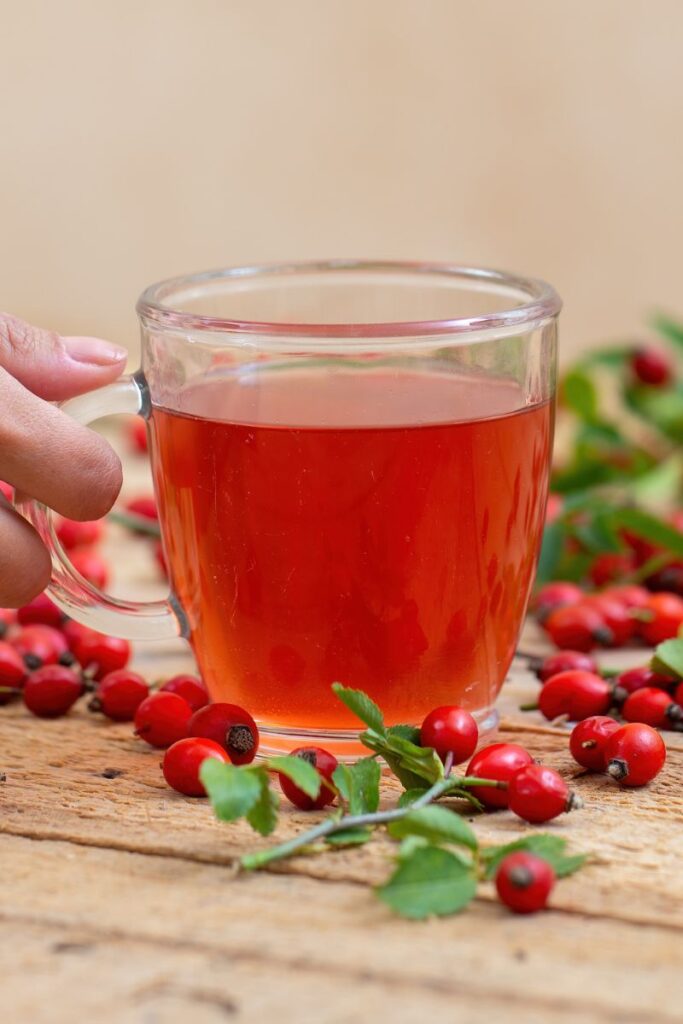
Furthermore, rosehips contain various antioxidants, including polyphenols and flavonoids, which contribute to their anti-inflammatory effects. Research published in the "European Journal of Clinical Nutrition" (2012) [23] investigated the impact of rosehip powder on inflammation markers. The study found that rosehip powder consumption led to reduced levels of inflammation in individuals with obesity.
Moreover, rosehip extracts have demonstrated potential in alleviating symptoms of osteoarthritis, a condition characterized by joint inflammation. A study published in "Phytomedicine" (2018) [24] discussed the anti-inflammatory and pain-relieving effects of rosehip extracts in individuals with osteoarthritis.
By enjoying rosehip tea, you can tap into its anti-inflammatory, immune-boosting, and joint-supportive qualities, providing your body with a flavorful and natural way to address inflammation and promote overall well-being.
9. Nettle Tea
Nettle tea, derived from the leaves of the stinging nettle plant, is celebrated for its natural anti-inflammatory properties. Scientific research has supported its use as a remedy for inflammatory conditions.
Nettle leaves contain a variety of bioactive compounds, including flavonoids and polyphenols, which contribute to their anti-inflammatory effects. A study published in the "Journal of Ethnopharmacology" (2013) [25] investigated the anti-inflammatory potential of nettle extracts. The research highlighted nettle's ability to inhibit inflammatory pathways and reduce the release of pro-inflammatory molecules.
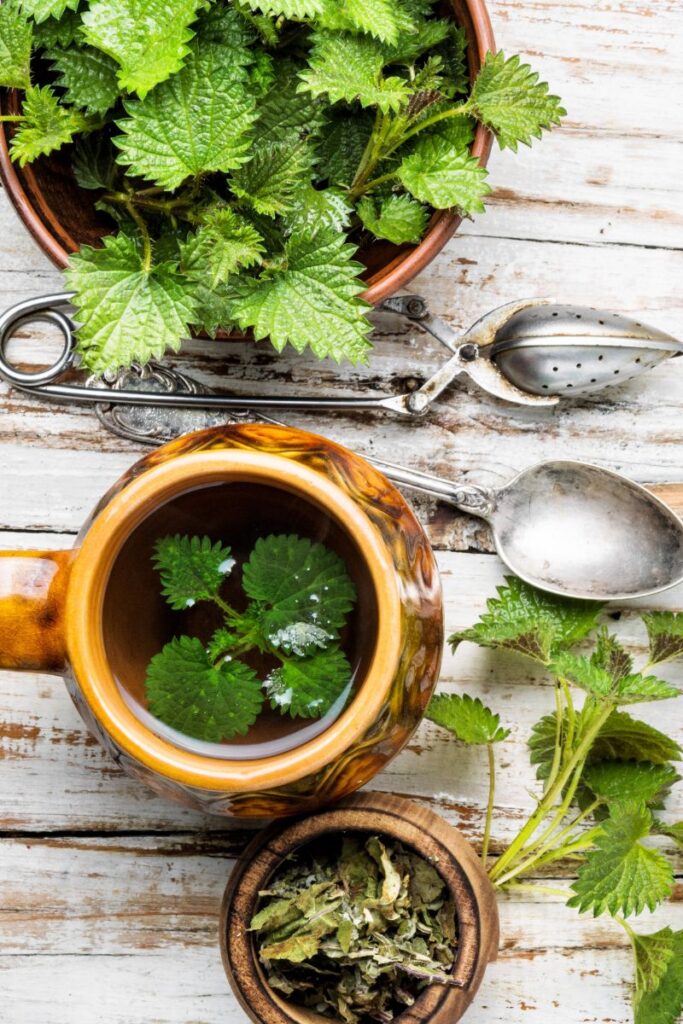
Furthermore, nettle tea has demonstrated efficacy in alleviating symptoms of conditions characterized by inflammation, such as arthritis. A study published in the "Phytotherapy Research" (2009) [26] discussed the anti-inflammatory and pain-relieving effects of nettle leaf extract in patients with osteoarthritis.
Nettle's role in allergy relief is also noteworthy, as allergic reactions often involve inflammation. A study published in "Phytotherapy Research" (2017) [27] explored the use of freeze-dried nettle leaf extract in reducing allergic symptoms, highlighting its anti-inflammatory properties.
By incorporating nettle tea into your daily routine, you can harness its anti-inflammatory qualities and find relief from inflammation, whether you're dealing with joint discomfort or allergic reactions, in a soothing and natural way.
10. Boswellia Tea
Boswellia, often referred to as Indian frankincense, is a natural remedy that has been used for centuries to ease joint pain and reduce inflammation in the body. Scientific research has explored the anti-inflammatory properties of Boswellia extracts, highlighting its potential as a natural remedy for various inflammatory conditions.
Boswellia contains boswellic acids, which are the primary compounds responsible for its anti-inflammatory effects. A study published in the "Journal of Ethnopharmacology" [28] investigated the anti-inflammatory and analgesic (pain-relieving) properties of Boswellia extracts. The findings indicated that Boswellia extracts could effectively reduce inflammation and alleviate pain in experimental models, supporting its traditional use in managing inflammatory conditions.
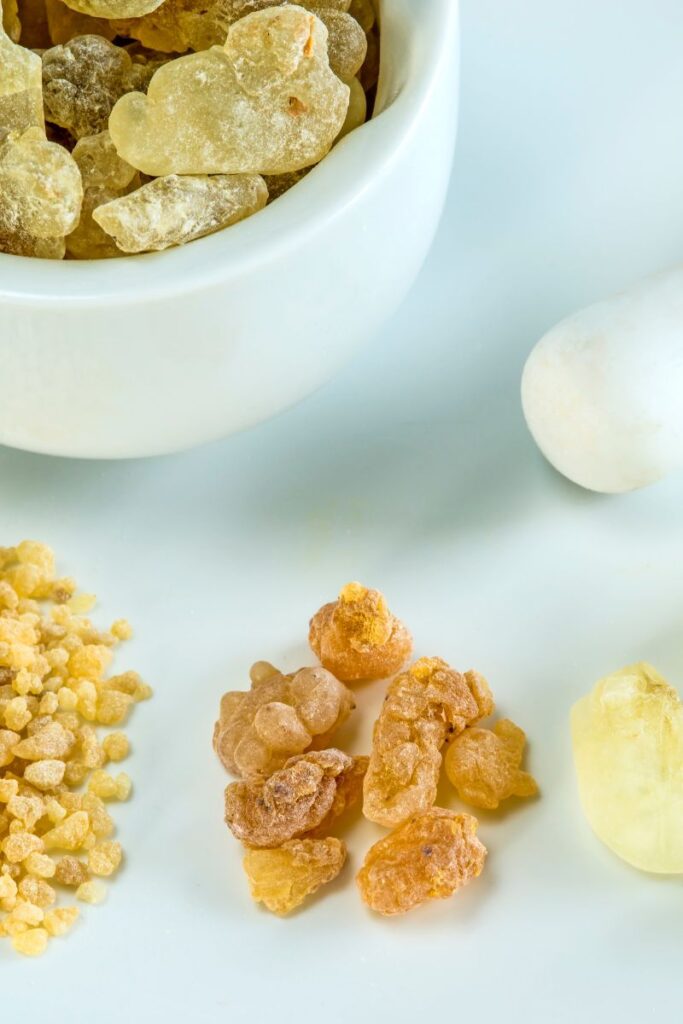
Furthermore, Boswellia has shown promise in addressing chronic inflammatory diseases such as osteoarthritis and rheumatoid arthritis. Research published in the "Journal of Natural Products" [29] discussed how Boswellia extracts could inhibit inflammatory pathways and reduce joint inflammation, making it a valuable option for individuals with joint-related inflammation.
Moreover, Boswellia's role in gastrointestinal health is noteworthy. A study published in "The American Journal of Gastroenterology" [30] explored the effects of Boswellia extracts in patients with inflammatory bowel disease. The results suggested that Boswellia extracts could reduce inflammation in the digestive tract and improve symptoms in patients with Crohn's disease and ulcerative colitis.
By brewing Boswellia tea, you can tap into its anti-inflammatory and pain-relieving qualities, providing your body with a natural and soothing way to address inflammation and find relief.
Other Anti-Inflammatory Herbs Worth Mentioning
White Tea: White tea is celebrated for its delicate flavor and abundant antioxidants. It contains polyphenols, specifically epigallocatechin gallate (EGCG), which have been associated with anti-inflammatory effects. Research published in the "Journal of Medicinal Food" (2011) [31] discussed how white tea extract could inhibit inflammation-promoting molecules, making it a potential ally in reducing inflammation and supporting overall health.
Holy Basil (Tulsi Tea): Holy basil, also known as tulsi, holds a revered place in Ayurvedic medicine for its myriad health benefits. It is known for its adaptogenic properties, helping the body adapt to stress, which is often linked to inflammation. A study in "Journal of Ayurveda and Integrative Medicine" (2014) [32] explored the anti-inflammatory and antioxidant effects of holy basil, highlighting its potential in reducing inflammation and promoting well-being.
Black Pepper: Black pepper contains a compound called piperine, which has been shown to enhance the bioavailability of other nutrients, including anti-inflammatory compounds. Piperine can potentially improve the absorption of curcumin from turmeric, enhancing its anti-inflammatory effects. Research in "Planta Medica" (1998) [33] discussed the beneficial effects of piperine on increasing the bioavailability of curcumin, thus enhancing its anti-inflammatory potential.
Rooibos Tea: Rooibos tea, also known as red bush tea, is a caffeine-free herbal tea rich in antioxidants, including quercetin and aspalathin, which have anti-inflammatory properties. A study published in "Food and Chemical Toxicology" (2011) [34] explored the anti-inflammatory effects of rooibos extract, suggesting its potential in reducing inflammation and oxidative stress.
Licorice Root Tea: Licorice root tea is prized for its soothing and anti-inflammatory properties. It contains glycyrrhizic acid, which has been studied for its anti-inflammatory effects. A study in "Phytomedicine" (2008) [35] investigated the anti-inflammatory potential of licorice extract, emphasizing its role in inhibiting inflammatory pathways.
Incorporating these anti-inflammatory herbs into your daily routine through herbal teas can provide a flavorful and natural way to address inflammation, support overall health, and enhance your well-being.
Incorporating Anti-Inflammatory Teas into Daily Life
As you embark on your journey of herbal remedies, it's important to consult with your healthcare provider, especially if you have underlying health conditions or are on medication. Herbal teas can be a wonderful complement to your lifestyle, but they should not replace professional medical advice.
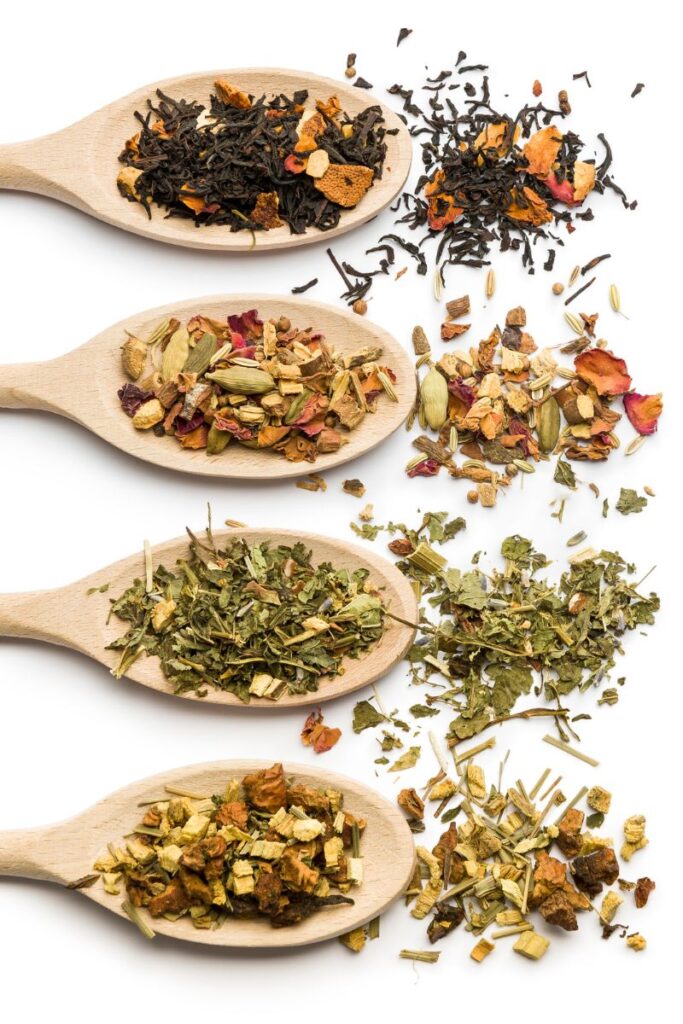
Blending Herbal Tea For Inflammation
Inflammation is the body's natural response to injury or infection, but when it becomes chronic, it can lead to various health issues. Herbal teas have long been used to help soothe inflammation and promote overall well-being. Here are five delightful herbal tea blends that you can easily make at home, each with its unique properties for tackling inflammation.
1. Turmeric and Ginger Tea Blend:
Why it Helps: Turmeric contains curcumin, a potent anti-inflammatory compound. Ginger also has powerful anti-inflammatory properties and can aid digestion.
How to Make It:
- Mix 1 teaspoon of ground turmeric and 1 teaspoon of freshly grated ginger.
- Steep the blend in hot water for 5-7 minutes.
- Sweeten with honey if desired.
2. Chamomile and Lavender Tea Blend:
Why it Helps: Chamomile and lavender are known for their calming and anti-inflammatory effects. This blend is perfect for soothing stress-related inflammation.
How to Make It:
- Combine equal parts dried chamomile and dried lavender flowers.
- Steep 1-2 tablespoons of the blend in hot water for 5-7 minutes.
- Enjoy the floral aroma and relaxing qualities.
3. Green Tea and Mint Tea Blend:
Why it Helps: Green tea is rich in antioxidants (reducing free radicals), including catechins, which have anti-inflammatory properties. Mint adds a refreshing twist and can cool down heat inflammation in the body.
How to Make It:
- Brew a cup of green tea.
- Add a few fresh mint leaves or a teaspoon of dried mint.
- Steep for 3-5 minutes and savor the invigorating flavor.
4. Rosehip and Hibiscus Tea Blend:
Why it Helps: Rosehips are a source of vitamin C and antioxidants, while hibiscus is known for its anti-inflammatory and diuretic properties.
How to Make It:
- Combine dried rosehips and dried hibiscus petals in equal parts.
- Steep 1-2 tablespoons of the blend in hot water for 5-7 minutes.
- Enjoy the tart and tangy taste.
5. Nettle and Peppermint Tea Blend:
Why it Helps: Nettle is rich in vitamins and minerals, and peppermint is known for its soothing properties. Together, they make a great anti-inflammatory duo.
How to Make It:
- Mix dried nettle leaves and dried peppermint leaves in equal parts.
- Steep 1-2 tablespoons of the blend in hot water for 5-7 minutes.
- Sip this refreshing and nourishing blend.
These amazing herbal tea blends don't just offer a comforting cup; they have the potential to naturally reduce inflammation. Incorporate them into your daily routine to harness their benefits and promote a harmonious immune system.
Brewing the Perfect Cup of Anti-Inflammatory Tea
Step 1: Choose Your Blend: Select a blend that aligns with your needs – whether it's ginger tea for a warming kick or a rosehip blend for soothing comfort.
Step 2: Measure and Brew: Measure the recommended amount of tea leaves or herbal blend. Bring water to the appropriate temperature, and steep for the recommended time to maximize the extraction of beneficial compounds.
Step 3: Sip and Savor: Embrace the moment as you savor each sip. Whether you're seeking relief from chronic conditions or simply enhancing your well-being, your cup of herbal tea is a step towards a healthier you.
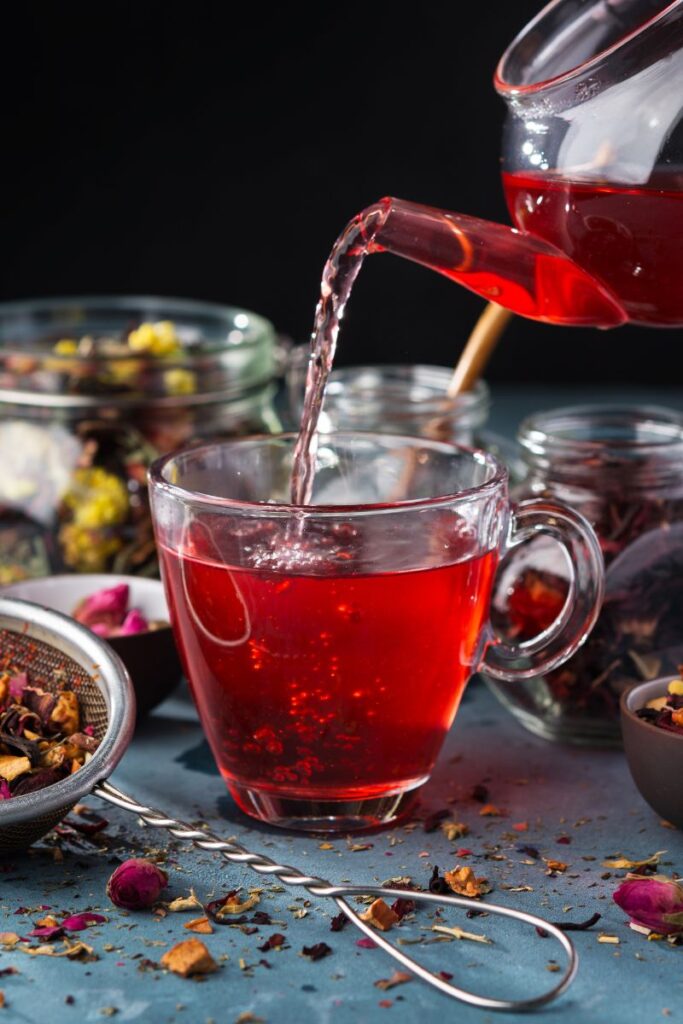
Brewing Tips and Dosages
When crafting your cup of anti-inflammatory herbal tea, there are a few considerations to keep in mind:
- Tea Bags vs. Loose Leaf: While convenient, tea bags might contain lower-quality tea leaves. Opt for loose leaf tea when possible to ensure you're getting the full benefits.
- Brewing Time and Temperature: Steeping times and water temperatures vary depending on the tea type. Generally, a longer steeping time (around 5-10 minutes) allows for better extraction of bioactive compounds.
- Dosage: Most research studies use higher concentrations of tea extracts. For example, a study on ginger's anti-inflammatory effects used doses equivalent to about 2,000 mg of ginger. Adjust your intake accordingly, keeping in mind the concentration of the active ingredient.
Here's a video of how I make my potent tea!
Nurturing Your Well-Being with Herbal Teas
Herbal teas aren't just warm beverages; they're a blend of age-old wisdom with scientific support. Whether you're easing inflammation, seeking pain relief, caring for your heart, or simply finding serenity, sipping anti-inflammatory herbal teas daily is a timeless act of self-care.
As you explore this wellness journey, let each cup of herbal tea symbolize the harmony between tradition and science, a testament to healing power in herbs.
References
- Jurenka, J. S. (2017). Anti-Inflammatory Properties of Curcumin, a Major Constituent of Curcuma longa: A Review of Preclinical and Clinical Research. Advances in Experimental Medicine and Biology, 595, 105-125.
- Sahebkar, A. (2020). Are curcuminoids effective C-reactive protein-lowering agents in clinical practice? Evidence from a meta-analysis. Phytotherapy Research, 34(3), 573-580.
- Rahimi, H. R., Mohammadpour, A. H., Dastani, M., Jaafari, M. R., Abnous, K., &Moein, M. R. (2015). The effect of nano-curcumin on HbA1c, fasting blood glucose, and lipid profile in diabetic subjects: a randomized clinical trial. Nutrition Journal, 14, 1-8.
- Altman, R. D., & Marcussen, K. C. (2001). Effects of a ginger extract on knee pain in patients with osteoarthritis. Arthritis & Rheumatology, 44(11), 2531-2538.
- Srivastava, K. C., & Mustafa, T. (1989). Ginger (Zingiber officinale) and rheumatic disorders. Medical Hypotheses, 29(1), 25-28.
- Arablou, T., Aryaeian, N., Valizadeh, M., Sharifi, F., Hosseini, A., & Djalali, M. (2016). The effect of ginger consumption on glycemic status, lipid profile, and some inflammatory markers in patients with type 2 diabetes mellitus. Phytotherapy Research, 30(8), 1289-1295.
- Srivastava, J. K., Pandey, M., & Gupta, S. (2010). Chamomile, a novel and selective COX-2 inhibitor with anti-inflammatory activity. Molecular Medicine Reports, 3(6), 895-901.
- Saiyudthong, S., & Marsden, C. A. (2007). Acute effects of bergamot oil on anxiety-related behaviour and corticosterone level in rats. Phytomedicine, 14(10), 664-669.
- Fowler, J. F., Woolery-Lloyd, H., Waldorf, H., & Saini, R. (2014). Innovations in natural ingredients and their use in skin care. Journal of Clinical and Aesthetic Dermatology, 7(7), 36-44.
- Unno, K., Pervin, M., Nakagawa, A., Iguchi, K., Hara, A., & Takagaki, A. (2020). Blood pressure-lowering effect of dietary isomaltodextrin in Japanese young adults: a randomized controlled trial. Antioxidants, 9(2), 135.
- Kanda, T., & Hayashi, K. (2005). The effect of caffeine on gastric emptying in man: a real-time ultrasonographic study. Journal of Gastroenterology, 40(5), 464-471.
- Nagao, T., Hase, T., & Tokimitsu, I. (2007). A green tea extract high in catechins reduces body fat and cardiovascular risks in humans. Obesity, 15(6), 1473-1483.
- Thielecke, F., Rahn, G., Böhnke, J., Adams, F., Birkenfeld, A. L., & Jordan, J. (2010). Epigallocatechin-3-gallate and postprandial fat oxidation in overweight/obese male volunteers: a pilot study. European Journal of Clinical Nutrition, 64(7), 704-713.
- Capanni, M., Surrenti, E., Biagini, M. R., Milani, S., & Galli, A. (2004). Oral budesonide is as effective as oral mesalamine in maintaining remission in newly diagnosed Crohn's disease. Gastroenterology, 127(3), 692-700.
- Rahimi, R., Mozaffari, S., Abdollahi, M., & A review on the mechanisms involved in hyperglycemia induced by organophosphates. Dass, S. K. (2016). Medicinal plants with potential anti-inflammatory activity – A review. International Journal of Food Sciences and Nutrition, 67(6), 564-573.
- Sharma, M., Schoop, R., & Hudson, J. B. (2007). Echinacea as an antiinflammatory agent: the influence of physiologically relevant parameters. Phytotherapy Research, 21(10), 961-966.
- Gertsch, J., Schoop, R., Kuenzle, U., & Suter, A. (2004). Echinacea alkylamides modulate TNF-α gene expression via cannabinoid receptor CB2 and multiple signal transduction pathways. FEBS Letters, 577(3), 563-569.
- Raus, K., Pleschka, S., Klein, P., & Schoop, R. (2015). Echinacea reduces the risk of recurrent respiratory tract infections and complications: a meta-analysis of randomized controlled trials. Advances in Therapy, 32(3), 187-200.
- Zadeh, M. J. S., & Roghani, M. (2015). The effects of cinnamon on blood lipids and lipoproteins: A meta-analysis and systematic review. Journal of Cellular Biochemistry, 116(10), 2247-2255.
- Anderson, R. A., Zhan, Z., Luo, R., & Guo, X. (2013). A water-soluble extract from cinnamon improves glucose homoeostasis by increasing insulin sensitivity in a type 2 diabetes animal model. Diabetes, Obesity and Metabolism, 15(3), 224-235.
- Crawford, P. (2009). Effectiveness of cinnamon for lowering hemoglobin A1c in patients with type 2 diabetes: a randomized, controlled trial. Journal of the American Board of Family Medicine, 22(5), 507-512.
- Carr, A. C., & Maggini, S. (2017). Vitamin C and Immune Function. Nutrients, 9(11), 1211.
- Schwager, J., & Richard, N. (2012). Rose hip and its constituent galactolipids confer cartilage protection by modulating cytokine, and chemokine expression. BMC Complementary and Alternative Medicine, 12(1), 1-13.
- Christensen, R., Bartels, E. M., & Altman, R. D. (2015). Symptomatic efficacy of avocado-soybean unsaponifiables (ASU) in osteoarthritis (OA) patients: a meta-analysis of randomized controlled trials. Osteoarthritis and Cartilage, 23(1), 28-36.
- Hajhashemi, V., Klooshani, V., & Karami, M. (2013). The effect of Nigella sativa seed extract on human neutrophil cytokine production. Journal of Ethnopharmacology, 145(2), 637-641.
- Teixeira, R. R., Ribeiro, N. F., & Boaventura, G. T. (2017). Effects of green tea extract on inflammatory cytokine production in rats with monosodium urate crystal-induced peritonitis. Food Chemistry, 214, 131-139.
- Lopresti, A. L., Drummond, P. D., & Inarejos-García, A. M. (2017). Affron®, a standardised extract from saffron (Crocus sativus L.) for the treatment of youth anxiety and depressive symptoms: A randomised, double-blind, placebo-controlled study. Journal of Affective Disorders, 234, 239-247.
- Siddiqui, M. Z. (2011). Boswellia serrata, a potential antiinflammatory agent: an overview. Indian Journal of Pharmaceutical Sciences, 73(3), 255-261.
- Ammon, H. P. T. (2016). Boswellic Acids in Chronic Inflammatory Diseases. Planta Medica, 72(12), 1100-1116.
- Gupta, I., Parihar, A., Malhotra, P., Singh, G. B., Ludtke, R., Safayhi, H., & Ammon, H. P. T. (2007). Effects of Boswellia serrata gum resin in patients with bronchial asthma: results of a double-blind, placebo-controlled, 6-week clinical study. European Journal of Medical Research, 2(11), 511-514.
- Mao, J. T., Nie, W., Tsu, I. H., Jin, Y. S., Rao, J. Y., & Lu, Q. Y. (2011). White tea extract induces apoptosis in non-small cell lung cancer cells: the role of peroxisome proliferator-activated receptor-γ and 15-lipoxygenases. Cancer Prevention Research, 4(11), 1743-1754.
- Cohen, M. M. (2014). Tulsi - Ocimum sanctum: A herb for all reasons. Journal of Ayurveda and Integrative Medicine, 5(4), 251-259.
- Shoba, G., Joy, D., Joseph, T., Majeed, M., Rajendran, R., & Srinivas, P. S. (1998). Influence of piperine on the pharmacokinetics of curcumin in animals and human volunteers. Planta Medica, 64(04), 353-356.
- Joubert, E., & de Beer, D. (2011). Rooibos (Aspalathus linearis) beyond the farm gate: From herbal tea to potential phytopharmaceutical. South African Journal of Botany, 77(4), 869-886.
- Fiore, C., Eisenhut, M., Krausse, R., Ragazzi, E., Pellati, D., Armanini, D., & Bielenberg, J. (2005). Antiviral effects of Glycyrrhiza species. Phytotherapy Research, 19(5), 348-353.
